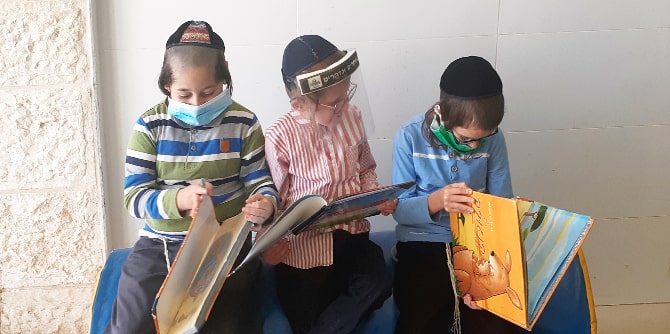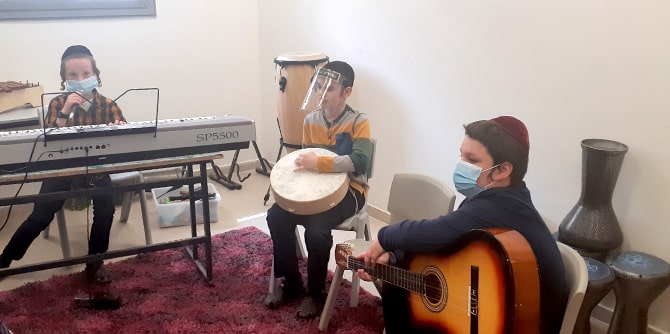The decision of the Israeli health and education ministries to shut down schools and transition to distance learning has affected schoolchildren and parents throughout Israel, and is even more detrimental in the case of the special education system. There, not only are students left without a highly personalized curriculum, but many have little to keep them occupied in the afternoons and evenings.
Since 2012,
Chinuch Ve’Atid (Futures – Institute of Future Special Education) has been operating a network of educational and professional training institutions in the ultra-Orthodox educational system for students with learning disabilities, behavioral issues, emotional disorders, and communication disorders, as well as for at-risk youth, who often lack supportive families and often come from low socioeconomic backgrounds. The students in these institutions are aged 7–21. They are divided into specialized classes by age, and receive individualized educational programming according to their specific needs. The institutions are located throughout country, largely in areas that previously had not been well-served in this regard.

The outbreak of COVID-19 and the decision to shut down schools and to transition to remote learning left students in the special education system without the individual, age-appropriate curriculum that provides the scaffolding necessary for them to progress. This led to serious concern that if these students do not receive the tools and materials necessary to help them weather the coronavirus crisis, it would widen educational, emotional and social gaps. In addition, parents found themselves without professional tools and guidance for dealing with their children and for keeping them occupied during leisure time. This was particularly challenging because many of the students are at high risk of infection and were required to remain at home.
To mitigate the impact of the crisis in their institutions, Chinuch Ve’Atid, founded by
Elchanan Visenshteren, a graduate of the Mandel Program for Leadership Development in the Haredi Community, developed a plan for reducing these gaps during the ongoing emergency situation, and received support for this initiative from the Mandel Foundation. The organization quickly prepared materials to make it possible to continue studies with minimal interruption. An adapted curriculum for each student enabled lessons to pick up where they had left off. A booklet with information, educational content, work pages and coloring pages was distributed to each family, providing students with constructive activities for the spare time they now had. Learning and educational materials were made accessible to parents online and to students via email. A free advice hotline was set up and quickly became very busy. An additional telephone line played stories and other content, providing yet another solution for enriching free time. Books were also purchased and given to students in order to encourage reading and to motivate students to keep studying during this unusual period of time. Significant work on Chinuch Ve'Atid’s website was also undertaken, to enable the students and their families to access a large and varied collection of material online.

Parents of students being serviced by the network shared some of their experiences during this very trying period and described how Chinuch Ve’Atid schools have helped them and their children to cope:
- Yossi (10) has behavioral and emotional disorders. In the words of his mother: “We would sit together, the whole family, and listen to the content on Chinuch Ve'Atid's special telephone line. Every day Revital, the school’s guidance counselor, gave me tips for relaxation exercises. These enabled me to relax and calm both myself and Yossi during his outbursts, and we both managed to get through this period successfully. Thank you all!”
- Avreimi (15) has an intellectual developmental disability. His father shared: “Thanks to the books we received for reading together with our children, I got to sit with my dear son and got to know him better, see his strengths and abilities, and discover his sense of humor, which I didn’t really know about. We laughed together so much during these past months. Thank you for this wonderful initiative.”
- Chaya, a mother of a child with special needs, called the advice hotline to consult with the school’s psychologist. She reported: “My son has significant motor problems and one evening I needed urgent advice about one of them. I called the hotline and received amazing advice and guidance! Throughout the period when we were at home, I worked with my son according to the guidance I received. When my son returned to school, I was told there was an improvement in his fine motor skills! I wouldn’t have been able to make any progress with him if it weren’t for the important advice I received. Thank you!”
Photos and video courtesy of Chinuch Ve’Atid (Futures – Institute of Future Special Education).
